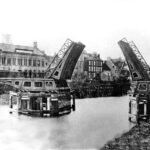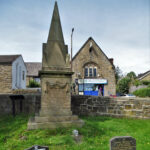27 January 1830: William Cobbett rides from Leeds to black Sheffield
William Cobbett. 1885. Rural Rides During the Years 1821 to 1832, Vol. 2. Ed. Pitt Cobbett. London: Reeves and Turner. Get it:
.Indices for all ballads etc. mentioned here: Mudcat 1899 / Roud 1044 @ Vaughan Williams ML & Bodleian
Unedited excerpt
If an excerpt is used in the book, it will be shorter, edited and, where applicable, translated.
From Leeds I proceeded on to [Sheffield], not being able to stop at either Wakefield or Barnsley, except merely to change horses. The people in those towns were apprised of the time that I should pass through them; and, at each place, great numbers assembled to see me, to shake me by the hand, and to request me to stop. I was so hoarse as not to be able to make the post-boy hear me when I called to him; and, therefore, it would have been useless to stop; yet I promised to go back if my time and my voice would allow me. They do not; and I have written to the gentlemen of those places to inform them, that when I go to Scotland in the spring, I will not fail to stop in those towns, in order to express my gratitude to them. All the way along, from Leeds to Sheffield, it is coal and iron, and iron and coal. It was dark before we reached Sheffield; so that we saw the iron furnaces in all the horrible splendour of their everlasting blaze. Nothing can be conceived more grand or more terrific than the yellow waves of fire that incessantly issue from the top of these furnaces, some of which are close by the way-side. Nature has placed the beds of iron and the beds of coal alongside of each other, and art has taught man to make one to operate upon the other, as to turn the iron-stone into liquid matter, which is drained off from the bottom of the furnace, and afterwards moulded into blocks and bars, and all sorts of things. The combustibles are put into the top of the furnace, which stands thirty, forty, or fifty feet up in the air, and the ever blazing mouth of which is kept supplied with coal and coke and iron stone, from little iron wagons forced up by steam, and brought down again to be re-filled. It is a surprising thing to behold; and it is impossible to behold it without being convinced that, whatever other nations may do with cotton and with wool, they will never equal England with regard to things made of iron and steel. This Sheffield, and the land all about it, is one bed of iron and coal. They call it black Sheffield, and black enough it is; but from this one town and its environs go nine-tenths of the knives that are used in the whole world; there being, I understand, no knives made at Birmingham; the manufacture of which place consists of the larger sort of implements, of locks of all sorts, and guns and swords, and of all the endless articles of hardware which go to the furnishing of a house. As to the land, viewed in the way of agriculture, it really does appear to be very little worth. I have not seen, except at Harewood and Ripley, a stack of wheat since I came into Yorkshire; and even there, the whole I saw; and all that I have seen since I came into Yorkshire; and all that I saw during a ride of six miles that I took into Derbyshire the day before yesterday; all put together would not make the one-half of what I have many times seen in one single rick-yard of the vales of Wiltshire. But this is all very proper: these coal-diggers, and iron-melters, and knife-makers, compel us to send the food to them, which, indeed, we do very cheerfully, in exchange for the produce of their rocks, and the wondrous works of their hands.
The trade of Sheffield has fallen off less in proportion than that of the other manufacturing districts. North America, and particularly the United States, where the people have so much victuals to cut, form a great branch of the custom of this town. If the people of Sheffield could only receive a tenth part of what their knives sell for by retail in America, Sheffield might pave its streets with silver. A gross of knives and forks is sold to the Americans for less than three knives and forks can be bought at retail in a country store in America. No fear of rivalship in this trade. The Americans may lay on their tariff, and double it, and triple it; but as long as they continue to cut their victuals, from Sheffield they must have the things to cut it with.
The ragged hills all round about this town are bespangled with groups of houses inhabited by the working cutlers. They have not suffered like the working weavers; for, to make knives, there must be the hand of man. Therefore, machinery cannot come to destroy the wages of the labourer. The home demand has been very much diminished; but still the depression has here not been what it has been, and what it is, where the machinery can be brought into play. We are here just upon the borders of Derbyshire, a nook of which runs up and separates Yorkshire from Nottinghamshire. I went to a village, the day before yesterday, called Mosborough, the whole of the people of which are employed in the making of sickles and scythes; and where, as I was told, they are very well off even in these times. A prodigious quantity of these things go to the United States of America. In short, there are about twelve millions of people there continually consuming these things; and the hardware merchants here have their agents and their stores in the great towns of America, which country, as far as relates to this branch of business, is still a part of old England.
Upon my arriving here on Wednesday night, the 27th instant, I by no means intended to lecture until I should be a little recovered from my cold; but, to my great mortification, I found that the lecture had been advertised, and that great numbers of persons had actually assembled. To send them out again, and give back the money, was a thing not to be attempted. I, therefore, went to the Music Hall, the place which had been taken for the purpose, gave them a specimen of the state of my voice, asked them whether I should proceed, and they, answering in the affirmative, on I went. I then rested until yesterday, and shall conclude my labours here to-morrow, and then proceed to “fair Nottingham,” as we used to sing when I was a boy, in celebrating the glorious exploits of “Robin Hood and Little John.” By the by, as we went from Huddersfield to Dewsbury, we passed by a hill which is celebrated as being the burial-place of the famed Robin Hood, of whom the people in this country talk to this day.
Comment
Comment
I wonder if Cobbett’s “fair Nottingham” above is proof that “Nottamun Town” family of songs, generally thought to be American, was also present in England. It begins something like this:
In fair Nottamun town, not a soul would look up
Not a soul would look up, not a soul would look down
Not a soul would look up, not a soul would look down
To show me the way to fair Nottamun town.
Here’s Jean Ritchie:
Something to say? Get in touch
Similar
 1 July 1840: The opening of the Hull and Selby Railway terminates the threat to Hull’s port from Goole, Scarborough and Bridlington
1 July 1840: The opening of the Hull and Selby Railway terminates the threat to Hull’s port from Goole, Scarborough and Bridlington
Comment
Comment
Does the reported repetition of “The day hole is about four feet wide, and five and a half feet high” in the evidence of Joseph Holling, child-miner, and Benjamin Mellor, the owner’s agent, indicate that witnesses had been coached before this cursory inquest so as to avoid any imputation of liability re safety procedures, quite aside from the lethal engineering of the pit? (An example re the latter: since time immemorial dayholes either slope upwards into mines to allow ground water to flow out and avoid dangerous ingress, or a foolproof drainage system is devised.) Was the employment law reform that followed – Mines and Collieries Act 1842 – the result of a wider perception that the owners had got away with homicide, or were people simply upset that children had been the victims?
Several links:
- https://www.nmrs.org.uk/mines-map/accidents-disasters/yorkshire/huskar-colliery-moorend-pit-flooding-barnsley-1838/
- https://penistonearchive.co.uk/huskar-pit-disaster/
- https://historicengland.org.uk/listing/the-list/list-entry/1151741
- https://coldwell.one-name.net/wp/2016/07/25/bulla-hall-deeds-etc/
- https://nmrs.org.uk/mines-map/accidents-disasters/yorkshire/huskar-colliery-moorend-pit-flooding-barnsley-1838/
Day drifts or day holes are galleries or inclined planes driven from the surface so that men can walk underground to and from their work without descending and ascending a shaft.
Full inscription on the principal face of the memorial – Neil Theasby also has photos of the rest:
Take ye heed, watch and pray: for ye know not when the time is. Mark XIII Chap 33 Verse.
THIS MONUMENT was erected to perpetuate the remembrance of an awful visitation of the Almighty which took place in this Parish on the 4th day of July 1838.
On that eventful day the Lord sent forth His Thunder, Lightning, Hail and Rain, carrying devastation before them, and by a sudden irruption of Water into the Coalpits of R.C. Clarke Esqr. twenty six human beings whose names are recorded here were suddenly Summon’d to appear before their Maker.
READER REMEMBER!
Every neglected call of God will appear against Thee at the Day of Judgment.
Let this Solemn Warning then sink deep into thy heart & so prepare thee that the Lord when he cometh may find thee WATCHING.
Something to say? Get in touch
Search
Donate
Music & books
Place-People-Play: Childcare (and the Kazookestra) on the Headingley/Weetwood borders next to Meanwood Park.
Music from and about Yorkshire by Leeds's Singing Organ-Grinder.



 Bluesky
Bluesky Extwitter
Extwitter